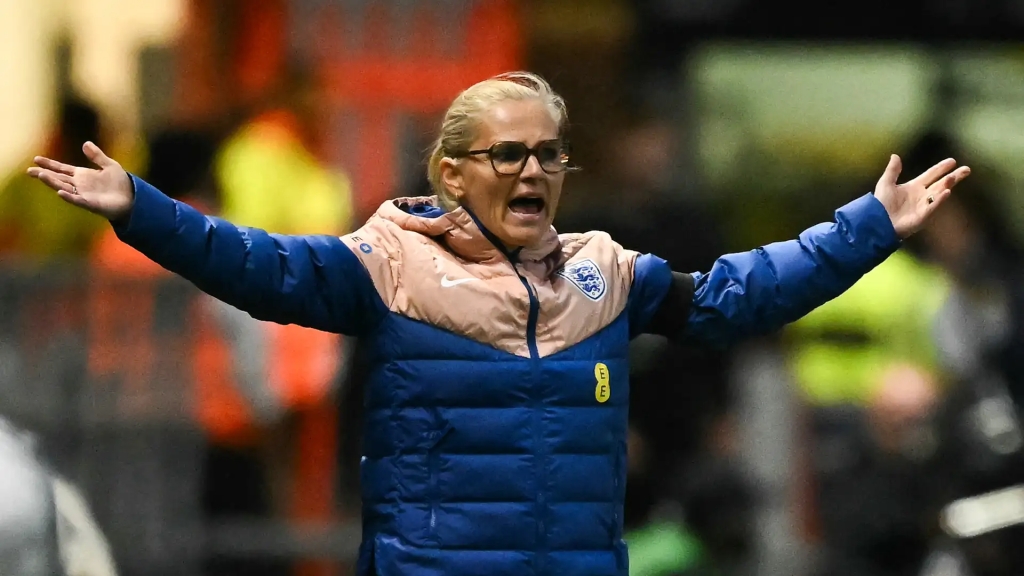By Catherine MacKenzie (12/04/2025)
Above: England celebrate a goal against Belgium. Photo: Shell Lawrence for Impetus.
Last week, England’s Lionesses faced Belgium twice in a double-header in the UEFA Women’s Nations League. Post-camp, head coach Sarina Wiegman has focused on the potential for learning to promote growth. So what have the fans, players, and head coach herself learned about England as a result of the double-header?
Fans
Whilst it has been argued extensively that we saw the best and worst of England in their double header against Belgium, it is also arguable that we have seen the best and worst of fan and media reaction to them. Following Friday’s riot in Bristol which saw the Lionesses score five and concede none, there were claims of “we are going to win the Euros”; a sense that the team was building momentum ahead of this summer’s European Championships.
There was a build-up of belief that England had figured it all out, that they would not lose a match again anytime soon. Wiegman chose a typically more measured assessment, claiming that whilst her team were moving in the right direction, there was still a lot to improve on.
The overwhelmingly positive reaction to the match from fans and media was tempered with the news that Lauren James and then Alessia Russo would withdraw from camp due to injuries picked up in that 5-0 drubbing. This is where the change in narrative started; suddenly Wiegman was receiving threats from Chelsea fans convinced James should have been rested, and there was a sense of impending doom due to the sheer volume of injuries this squad was dealing with.
If we like to build up the Lionesses to impossible heights, we also seem to enjoy seeing and hastening their fall. After 30 minutes in Leuven, the Lionesses were down by three goals. The injury to James meant Aggie Beever-Jones was playing on the left, and her lack of back-tracking combined with an uncharacteristically poor performance from Niamh Charles meant the left flank was completely exposed.
The response to the opening 30 minutes echoed the response to the Lionesses’ performance against Germany in October 2024 – although that was a friendly match used to experiment with tactics, there was a sense that the Lionesses and their head coach were ‘finished’, and that action needed to be taken to prevent a further fall.
 Above: Gulia Gwinn celebrates scoring her second against England. Photo: Zac Goodwin/PA
Above: Gulia Gwinn celebrates scoring her second against England. Photo: Zac Goodwin/PAReviews of the game in Leuven by fans and media alike focused on the injury situation – but instead of providing context for a loss that felt avoidable if one or two more creative players were fit – the reviews focused on an inability to adapt to injuries in key positions.
This would be a stronger argument if one or two important players were missing, but in Belgium the Lionesses were missing what is arguably half of their ideal starting line-up: Georgia Stanway, Lauren James, Lauren Hemp, Alessia Russo and Alex Greenwood are all likely starters if fit.
As fans, we choose how to respond to wins and losses; we choose what to focus on and what we spend our energy thinking about. This is not to say that criticism is invalid; rather that criticism without context enhances the potential for abuse and a world that is irrevocably black and white, that is dangerously reactive and that breeds negativity.
We have enough of that in the football world already, and as women’s football is still growing, we can make our community different. It is our responsibility to make the most of the opportunity we have.
Players
Whilst Wiegman spoke of “expecting a different game” in Leuven and the need to avoid complacency, their performance overall suggested that her players may have needed to hear a stronger message. There was a feeling during the game that the Lionesses had perhaps underestimated their opponent due to the five-nil drubbing days before, and that Belgian captain Tessa Wullaert could be dealt with without too much effort.
We have seen this complacency before from the squad in games where they have the tag of being strong favourites. We know that the Lionesses can ramp up their performances when under pressure – during tournaments and when, for example, they needed to win against France last summer to retain hope of finishing in the top two of their Euro qualifying group.
The away leg against Belgium has hopefully reinforced the message that in a time when many countries have improved their national teams dramatically, there is unlikely to be an ‘easy’ game anymore. If the fans must learn this lesson, then the players must too.
Head coach and staff
For Wiegman, this has been a mixed window. Her team’s performance in the first leg was widely praised, as was their head coach for her substitutions. Heading towards a summer tournament, the biggest learning that Wiegman can take from these games is who has already guaranteed a seat on the plane to Switzerland in July, and who is looking set for a spot in the starting eleven.
 Above: Sarina Wiegman in Leuven. Photo: AFP.
Above: Sarina Wiegman in Leuven. Photo: AFP.With the last few games of the club season fast approaching, she will also be hoping to avoid any further injuries – and that some of her missing players can build up some game time before the WSL ends.
There has also likely been a learning around the fans’ expectations, especially following strong wins against Spain and Belgium in the first leg.
Perhaps most importantly, Wiegman will have learned the areas her team must focus on ahead of this summer. From defensive lapses in concentration to the importance of being clinical in front of goal, the head coach will be keen to plug these gaps ahead of the remaining Nations League games against Portugal and Spain.
Follow Impetus on social media –
Twitter (X): @impetusfootball TikTok: @impetusfootball
Instagram: @impetusfootball
